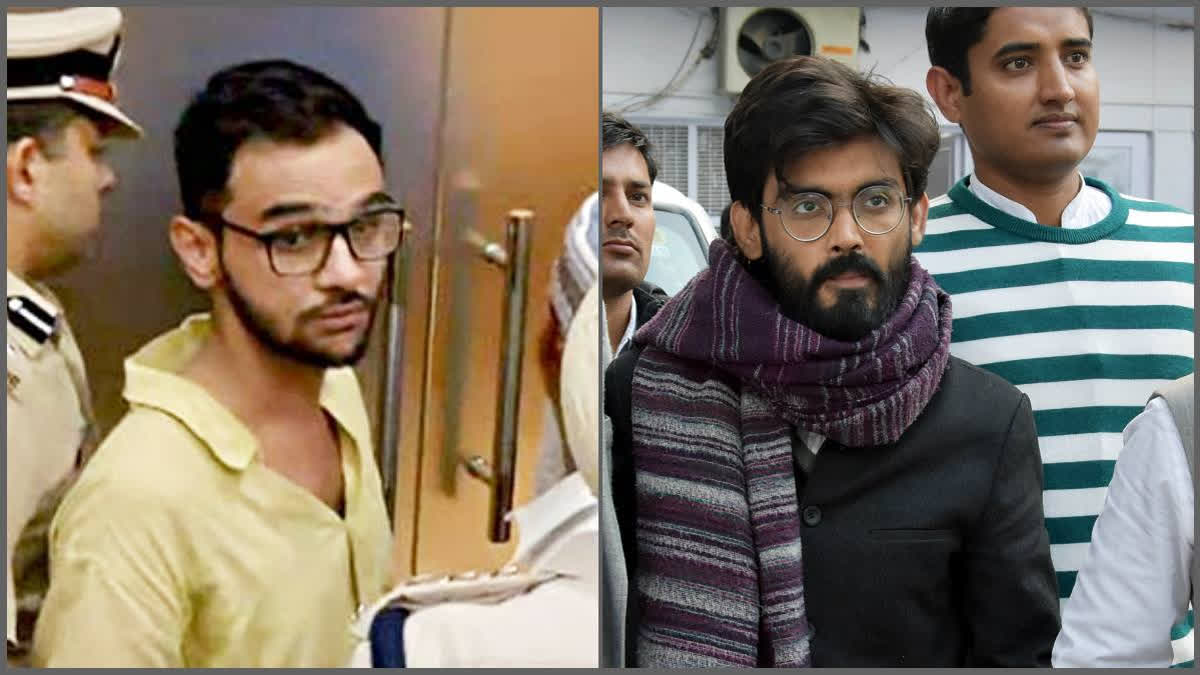The Delhi High Court today pronounced its verdict on the bail pleas of Umar Khalid, Sharjeel Imam, and seven other accused persons in the 2020 Delhi riots “larger conspiracy” case. A Division Bench of Justice Naveen Chawla and Justice Shalinder Kaur delivered the judgment at 2:30 pm, nearly five years after the riots that shook Northeast Delhi. Justice Shalinder Kaur, reading out the judgment, announced: “All appeals are dismissed.”
The verdict covers the bail applications of Umar Khalid, Sharjeel Imam, Athar Khan, Khalid Saifi, Mohd Saleem Khan, Shifa-Ur-Rehman, Meeran Haider, Gulfisha Fatima, and Shadab Ahmed.
Another coordinate bench of Justice Subramonium Prasad and Justice Harish Vaidyanathan Shankar pronounced a separate order denying bail at 2:30 pm on the bail plea of co-accused Tasleem Ahmed. The Delhi High Court on Tuesday dismissed the bail plea filed by Tasleem Ahmed, accused in the UAPA case alleging larger conspiracy in the commission of 2020 North-East Delhi riots.
All of these accused had challenged orders of the trial court which had consistently denied them bail under FIR 59 of 2020, registered by the Delhi Police Special Cell.
Background of the Case
The Northeast Delhi riots of February 2020 left 53 people dead and over 700 injured. The Delhi Police alleged that the violence was not spontaneous but the result of a “deep-rooted conspiracy” linked to protests against the Citizenship Amendment Act (CAA).
- FIR 59 of 2020 was lodged on March 6, 2020 by the Special Cell.
- Multiple chargesheets – five in total – were filed between September 16, 2020 and June 7, 2023.
- The prosecution invoked provisions of the Indian Penal Code, 1860 and the Unlawful Activities (Prevention) Act, 1967 (UAPA).
- Out of the 18 originally arrested, 12 remain in custody. The case is presently at the stage of arguments on charge, with over 897 witnesses cited.
The Delhi Police’s case rests on:
- WhatsApp group chats (notably Muslim Students of JNU (MSJ), Jamia Coordination Committee (JCC), and Delhi Protest Support Group (DPSG)).
- Protected witness statements.
- CCTV footage and digital records.
According to the Special Cell, the accused coordinated protests across 23 sites near mosques and main roads in Muslim-majority areas, which were to escalate into a “chakka jam” during then US President Donald Trump’s February 2020 visit — allegedly to embarrass India globally.
Accused persons and key bail arguments
Umar Khalid
- Represented by Senior Advocate Trideep Pais.
- Submitted that merely being part of WhatsApp groups without posting messages is not criminality.
- Argued that no recovery was made from him and that the alleged “secret” meeting on February 23–24 was not clandestine.
- Stated that no witness statement specifically attributes terrorism-related acts to him.
- Claimed parity with co-accused who had graver allegations but were granted bail.
Sharjeel Imam
- Represented by Advocate Talib Mustafa.
- Stated he was disconnected from co-accused and not part of conspiracy meetings.
- The last act attributed to him was a speech in Bihar on January 23, 2020, predating the riots.
- Argued entitlement to statutory bail under Section 436A CrPC, since he had already spent more than 4 years in custody (over half of the 7-year maximum for UAPA Section 13).
Khalid Saifi
- Represented by Senior Advocate Rebecca John.
- Questioned reliance on “innocuous messages” under UAPA.
- Invoked parity with three co-accused granted bail in June 2021.
- Submitted that chakka jams were a common protest tool, not terrorism.
Shifa-Ur-Rehman
- Said he had already spent more than 5 years in custody.
- Highlighted that participation in protests/meetings cannot be criminalised.
- Argued delay in trial and inconsistencies in witness statements.
Gulfisha Fatima
- Contended she had no active participation in the alleged conspiracy.
- Argued for bail on grounds of parity with those already released.
Meeran Haider
- Echoed parity and delay arguments.
- Asserted that protected witness statements only indicated protest participation.
Mohd. Saleem Khan
- Argued bail on parity and prolonged incarceration.
Athar Khan
- Argued on parity with co-accused already released.
Tasleem Ahmed
- Represented by Advocate Mehmood Pracha.
- Argued delay in trial; over 5 years in custody without seeking adjournments.
Shadab Ahmed
- Plea heard separately; argued contradictions in witness statements and parity with other bail orders.
Prosecution’s Case (Delhi Police)
Represented by Solicitor General Tushar Mehta and Special Public Prosecutor Amit Prasad, the State opposed all bail pleas.
- Mehta described the probe as one of the “finest investigations” carried out.
- Claimed the riots were “pre-planned, well-organised and sinister,” aimed at dividing the nation on religious lines.
- Alleged that the accused intended to globally embarrass India during Trump’s visit by triggering violence.
- Cited Sharjeel Imam’s speeches, claiming they set a timeline for escalating protests.
- Emphasised that this was not a case of “mere riots” but a premeditated attack on sovereignty.
- Highlighted use of a large iron “gulel” (catapult) as evidence of violent preparation.
- Alleged fake documents used for SIM cards and reference to financial irregularities.
- Stressed that long incarceration cannot justify bail in UAPA cases of national security.
During the hearing, according to LiveLaw, SG Mehta said that “If you are doing something against the nation, then you better be in jail till you are acquitted or convicted.”
Related:
How the Delhi riots case remains stagnant with close to a dozen student leaders incarcerated
5 Years of Delhi Riots: Some Punished, Some Rewarded!
Delhi Riots 2020: Umar Khalid withdraws plea from Supreme Court citing “change in circumstances”
Brinda Karat on the Third Anniversary of Delhi Riots- “Cannot Abandon Struggle for Justice”

